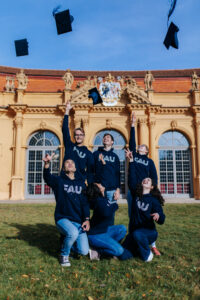Qualification profile of CME graduates

Graduates of the Master’s degree programme in Communications and Multimedia Engineering have a comprehensive command of the relevant methodologies of engineering sciences and have in-depth knowledge of all the essential fundamentals and current knowledge in the field of communications and multimedia technologies. Building on comprehensive knowledge of engineering mathematics, system and signal theory and communications transmission from a relevant bachelor’s degree, the graduate acquires the ability to further develop theoretical tools with regard to practice-relevant research and development in information technology and tests their use in application-oriented courses. In doing so, subject-specific depth is combined with cross-disciplinary and cross-problem applicability. The Master’s programme thus realises an engineering education oriented towards independent research and development and prepares graduates for demanding engineering work at the highest scientific level.
He or she thus possesses the engineering knowledge required for the development of modern communication and multimedia systems. In particular, she or he is able to design such systems independently, to implement them efficiently and to analyse the resulting behaviour theoretically and evaluate it experimentally. He or she is also used to working in international teams.
The application-oriented teaching events ensure that the graduate is already involved in scientific research during the degree programme and is familiar with current research methods. Through constant training of the ability to think abstractly and analytically, the graduate is able to familiarise himself/herself independently with new areas of activity in order to be able to deal with the constantly changing problems in professional practice.
With the Master’s thesis, the graduate demonstrates the ability to independently analyse complex simulation problems critically and to solve them using the most demanding engineering methods. By studying in an international environment, the graduate has also deepened his or her intercultural competence. Furthermore, he or she has a secure knowledge of English, both written and spoken, at least on the level of UNIcert C II or European Framework of Reference B2 (admission requirement). The English-language competence was considerably deepened in the course of the continuous English-language tuition and proven in the English-language version of the Master’s thesis.